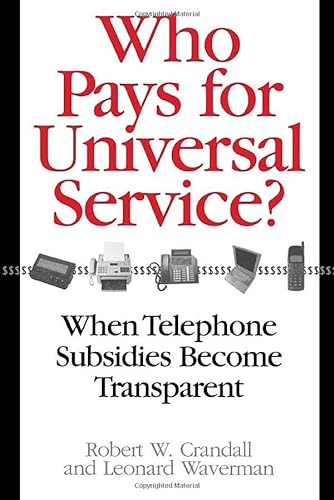Articoli correlati a Who Pays for Universal Services?: When Telephone Subsidies...

Le informazioni nella sezione "Riassunto" possono far riferimento a edizioni diverse di questo titolo.
Robert W. Crandall is a senior fellow in the Economic Studies program at the Brookings Institution, where his research has focused on telecommunications and cable television regulation, industrial organization and policy, and the changing regional structure of the U.S. economy. His previous books include Broadband: Should We Regulate Internet Access? (Brookings, 2002), Telecommunications Liberalization on Two Sides of the Atlantic (Brookings, 2001) and Who Pays for Universal Service? (Brookings, 2000). Leonard Waverman is professor of economics and director of the Centre for International Studies at the University of Toronto.
Le informazioni nella sezione "Su questo libro" possono far riferimento a edizioni diverse di questo titolo.
- EditoreBrookings Inst Pr
- Data di pubblicazione2000
- ISBN 10 0815716125
- ISBN 13 9780815716129
- RilegaturaCopertina rigida
- Numero di pagine199
Compra nuovo
Scopri di più su questo articolo
Spese di spedizione:
EUR 4,64
In U.S.A.
I migliori risultati di ricerca su AbeBooks
Who Pays for Universal Service? When Telephone Subsidies Become Transparent
Descrizione libro Hardcover. Condizione: New. 8vo, hardcover. NEW in dust jacket. Bright, crisp & clean, unread; dj glossy. xiii, 199 p. Codice articolo 1130129.23

